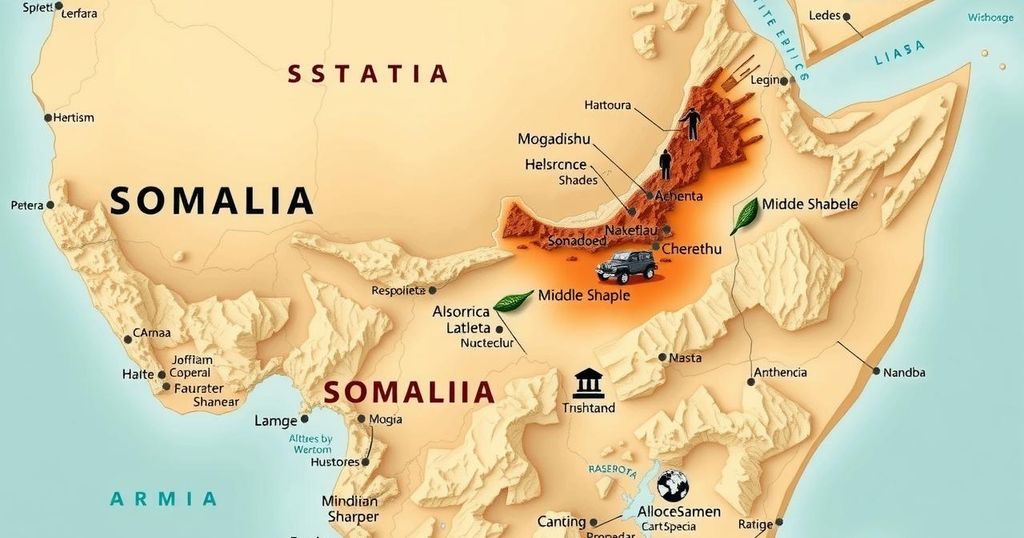Al-Shabab Resurgence in Somalia Poses New Threats to Government Stability

Al-Shabab militia in Somalia shows signs of resurgence, controlling strategic areas and threatening President Mohamud’s administration. The group’s advances raise concerns amid diminishing international support, particularly from the U.S. and the African Union. Analysts suggest that the government’s detour into political affairs might have allowed Al-Shabab to capitalize on local grievances, resulting in a precarious security situation around Mogadishu.
Recent developments indicate a resurgence of Somalia’s Al-Shabab militia, which has regained control over strategic areas and nearly assassinated President Hassan Sheikh Mohamud with a roadside bomb. Analysts report that after being under significant pressure in 2022 and 2023, the militant group is reversing previous losses amidst diminishing support from the United States and the African Union. Key locales in Middle and Lower Shabelle, as well as coastal regions, have fallen into Al-Shabab’s hands, posing increased risks to the capital, Mogadishu.
On March 18, a bomb blast narrowly avoided the president’s convoy, underscoring Al-Shabab’s persistent threat in Mogadishu. Following the president’s visit to the region intended to counter the militants, reports confirmed that Al-Shabab seized the town center of Masaajid Cali Gaduud. A local resident noted, “The Somali government forces and local community militias have retreated from the town, and Al-Shabab are now in control.”
Analyst Matt Bryden suggested that the government is currently losing vital strategic points, including several bridges necessary for movement and supply. He characterized the situation as one where evidence points towards a government in disarray, as local clan militias and security forces are mobilized for assistance. Concerns are growing among the populace in Mogadishu regarding the government’s capability to maintain security against Al-Shabab’s advances.
Despite the turmoil, President Mohamud remains resolute, asserting that, “The war will not stop; we are not coming back from where we are now, and we will attain the victory we seek”. However, the administration faces a precarious position with waning international backing. The African Union forces, which have provided support since 2007, are witnessing changes in their operational mandate, and the U.S. has not yet confirmed key financial contributions to the AU Support and Stabilization Mission in Somalia (AUSSOM).
Bryden noted a reduction in security assistance, particularly from U.S. sources, which could further affect the balance of power, favoring Al-Shabab. He cautioned that should support diminish, it could precipitate an escalation of hostilities by July or even sooner.
Contrary to dire assessments, some experts, like Omar Mahmood of the International Crisis Group, assert that Al-Shabab remains distant from significant threats to the capital. He highlighted the government’s distraction due to political concerns, positing that Al-Shabab’s current aggressiveness stems from exploiting clan grievances and the existing political instability surrounding electoral reforms. Mahmood concluded that the conflict resembles a stalemate rather than a straightforward advance towards Mogadishu.
In conclusion, Al-Shabab’s recent territorial gains in Somalia illustrate a troubling trend that places additional strain on President Mohamud’s government. As support from international allies appears to dwindle, there are growing concerns about the efficacy of Somali government forces in combating the militant threat. While some analysts describe the situation as potentially stabilizing, others underscore the urgent need for the administration to refocus its efforts on both security and political cohesion to mitigate the risks posed by Al-Shabab.
Original Source: www.arabnews.com








